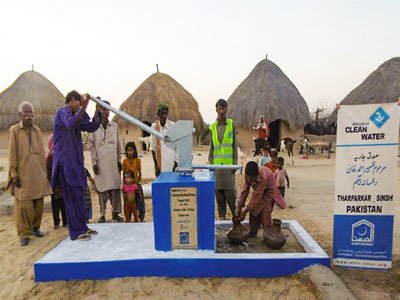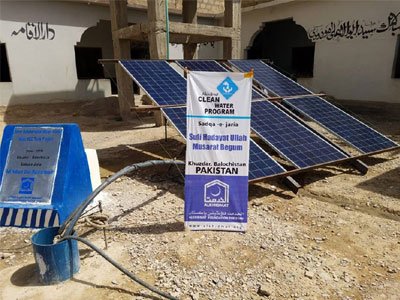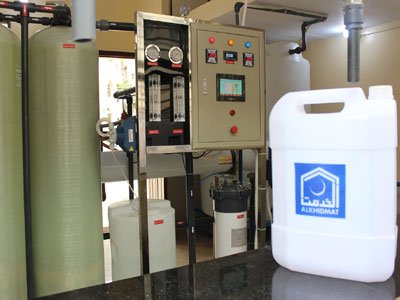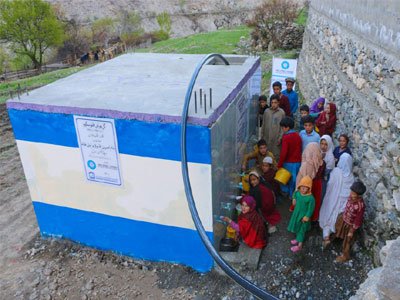
The grave condition of water scarcity is not new in Pakistan and the recent reports released by drinking water inspection authorities suggest that most of the people are drinking unhealthy water across the country. Global organizations have also placed Pakistan among countries where availability of clean drinking water is a serious issue.
Under Clean Water program, Alkhidmat Kawateen Trust Pakistan has completed hundreds of water projects that provide clean drinking water to needy communities across the country. This program ensures supply of clean drinking water in water scare areas as well as in big cities by installation of water pumps, hand pumps and water filtration plants. In the mountainous areas, gravity flow schemes are implemented to ensure supply of clean water to households.
The Afridev Pump is a conventional lever action hand pump. It is designed for heavy-duty use, serving communities of up to 300 individuals. The Afridev Pump is fully corrosion resistant, easy to install and has excellent potential for community-based maintenance.
This pump is also known as the Deep-well piston hand pump. Community hand pumps are ideal for villages and households in which surface sources are common, so only a basic pump suffices for communities trying to meet their water requirements. Suction hand pumps are economical, easy to install and maintain. Maintenance is done at the village level without the need for specialist parts. The pumps are made from cast iron.

It is a traditional source of water in rural areas of Pakistan. Earth is excavated deep to fetch water. Digging is done through various techniques including drilling, blasting etc. Cemented rings are put in open wells for long life and sustainability. Water motors and hand pulleys are used for pulling the water up, down from the wells.

Water pumping is generally dependent on conventional electricity. Solar pumping systems are environment friendly and require low maintenance with no fuel cost. Keeping in view the shortage of electricity in Urban, rural and remote areas in many parts of Pakistan, Solar power pumping is one of the most promising applications using solar energy. The technology is similar to conventional water pumping system i.e. electrical submersible water pumping except that the power source is solar energy. Solar Submersible water pumping technique is gaining importance in recent years due to non-availability of electricity. The flow rate of pumped water is dependent on incident solar radiation and size of PV array. A properly designed PV system results in significant long-term cost savings as compared to conventional pumping systems. In addition, tanks can be used for water storage in place of requirement.
Solar Submersible Water Pumping are best suitable to run systems for water pumping in remote areas or where electricity has frequent outage.

Water purification is the process of removing undesirable chemicals, biological contaminants, suspended solids and gases from contaminated water. The goal is to produce water fit for drinking purpose. Water purification plants are the source of providing pure, safe, and healthy drinking water to people. Water filtration plants make use of “Reverse ‘Osmosis processes for water purification Reverse Osmosis (RO) process is used on those areas where underground water condition is very not good i.e. Water is Saline.

The distribution of water is always troublesome in hilly and remote areas. To remedy the situation a reservoir of water is created mechanically and stored at a place where it could be easily disseminated to the required population. The scheme also involves the development of new water resources so that demand could be met along seamless provision lines

“Charity does not in any way decrease the wealth and the servant who forgives, Allah adds to his respect; and the one who shows humility, Allah elevates him in the estimation (of the people).” (Muslim Vol. 4, Hadith 6264)
Mr. Faheem local resident of thaparkar farming in deserts of Tharparkar with support of Alkhidmat Kawateen Trust Pakistan Wash project.
– Faheem, Resident Tharparkar